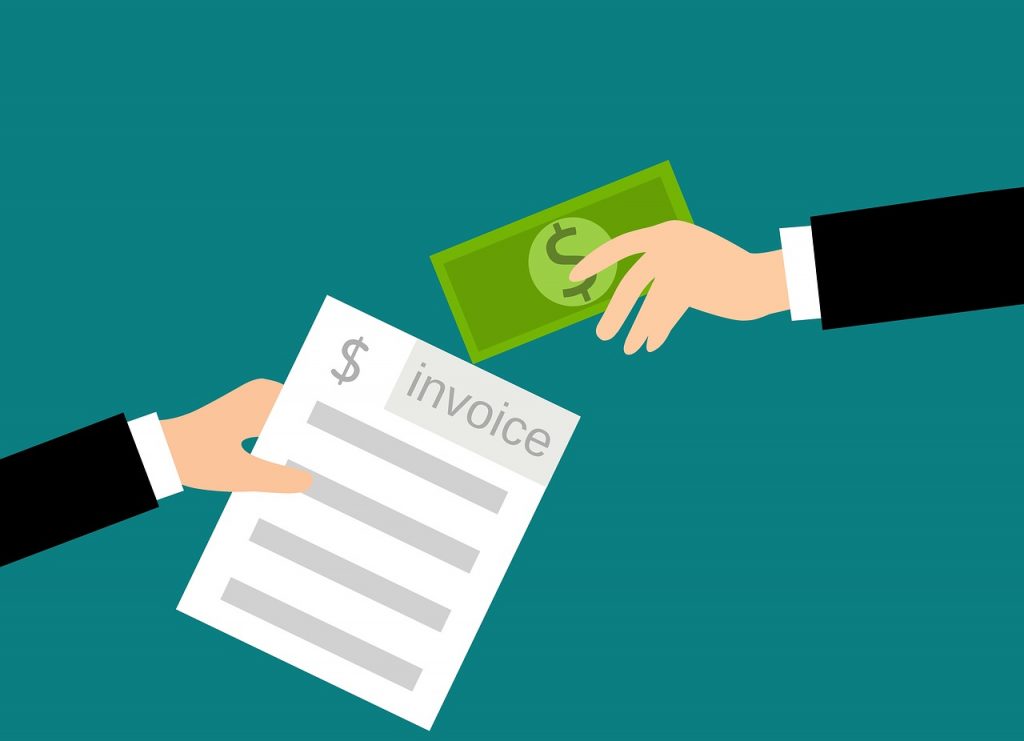What is Invoice Factoring?
Invoice factoring is a business’s sale of its accounts receivable (invoices for materials/services delivered to customers but not yet paid) to what is called a “factor” or invoice factoring company. Most factoring companies advance up to 90% of the invoice value up front. After your customers pay the invoice, any remaining balance is remitted minus the fee from the factoring company.
Other names for invoice factoring are accounts receivable factoring and invoice financing. However, with some invoice financing options, a business owner can secure a temporary loan using unpaid invoices as collateral.
How Does Invoice Factoring Work?
The first step in how invoice factoring works is to choose a factoring company to sell your unpaid invoices to. Next, the business owner can negotiate the terms of a financing agreement with the factoring company and then sell their outstanding invoices. After the invoice factoring company verifies the invoice value, they typically pay out 70 to 90% of the unpaid invoices.
In everyday speak, after a business owner’s customer pays the invoice, the factoring company pays out the business owner minus a fee delineated on the invoice factoring agreement. There are three parties involved in an invoice factoring transaction: A business, its customers, and the factoring company.
Here’s a Step by Step Breakdown of the Invoice Factoring Process:
- The Invoice factoring process begins after a business provides the goods or services to the customer and issues the total invoice.
- The business then sells that invoice to the factoring company provided the customer’s credit score is worthy of approval.
- In return, the business receives an immediate cash payment from the factoring company, up to 90% of the invoice value.
- The remainder of the outstanding invoice is paid to the business when the customer pays any remaining balance for the goods or services, minus any factoring fee owed to the financing company.
Pros and Cons of Invoice Factoring:
Invoice factoring is a great way to solve the problem of unpaid invoices and provides many benefits for B2B companies. However, there are some disadvantages, particularly for certain industries and/or business types. Below are some pros and cons of accounts receivable financing.
What are the Advantages of Invoice Factoring?
- Access to immediate cash
- Longer and more flexible net terms to customers
- The program is based on the credit of your customers, so if your credit score is bad, you might still qualify for better terms
What are the Disadvantages of Invoice Factoring?
- It’s not for all businesses, and the business must have clients with good credit and invoices outstanding
- Invoice factoring cost is than traditional financing programs like SBA loans and bank loans
- Even though the business sells its invoice to the factor, it can still be held liable customers fail to make payment
Does My Business Cash Flow Work for Invoice Factoring?
While considering if invoice factoring is the right product for your business financing needs, an important question to ask yourself is if it will be conducive to your business cash flow. For this, you’d have to know how much each factoring company will charge for their capital and understand how each option will affect your cash flow.
If you believe your business will make good use of the funding you receive before you would have received payment in full from your customers and it won’t cause immediate cash flow problems, then invoice factoring might be a good fit for your business.
How To Choose the Best Invoice Factoring Company for Your Business Needs:
The small business industry is making a comeback after the recent pandemic, but it’s not easy to keep up with all the needs of a company. That’s why many entrepreneurs turn to invoice factoring companies for help in managing their cash flow and keeping operations going smoothly.
But this isn’t something you can do without doing your research first! Here are some questions that address some concerns about accounts receivable factoring that will make sure you find the best finance provider for your unique situation.
What are the ins and outs of invoice factoring programs?
There are many types of invoice factoring companies, and you’ll want to make sure that the company matches your needs. It may be a good idea for some businesses to factor all their invoices while others might only need this service on an as-needed basis.
Take time at the outset to explore what options best suit your goals so there will never be any surprises down the line about how much funding you can access or which customers get funded first.
Below are some important factoring terms you should get familiar with before making your decision:
Invoice Factoring:
Invoice Factoring is when a business sells its accounts receivable at a discount rate to the factoring company in return for immediate cash. The advance on payments is typically 70 to 90 percent of the sold invoice.
Factoring is an excellent alternative to traditional bank loans because it provides more flexibility. The cash that you receive from the invoices submitted can be used for debt-free capital, making your company stronger and giving you peace of mind as well!
Invoice Financing:
The invoice financing process is an alternative to factoring. Business owners can use their outstanding invoices as collateral for a loan, taking on the responsibility of paying back both the debt and interest while still owning them in full. With more risk comes greater reward, though – if you have strong enough invoices, your business may be eligible for up to twice what it would get with factoring vs. financing!
Recourse Factoring:
With recourse factoring, business owners are responsible for their invoice if the customer fails to pay. If the customer doesn’t pay back your invoice to the factoring company with recourse factoring, you’ll need to cover it and buy out their debt from the factor. Recourse factoring can be a good lower-risk option for the factoring company and often more affordable than non-recourse for the business selling the invoices.
Non-Recourse Factoring:
Factoring your invoices with a non-recourse factoring company could be the best way to ensure you get paid for services without risking bad debt. Because they take on more responsibility than regular invoice factoring companies, non-recourse factors have the leverage to charge additional fees for that increased risk. On top of this, non-recourse factors may avoid accepting invoices from customers with bad credit and payment history.
Spot Factoring:
Spot Factoring is the perfect option if you need to factor a single invoice and are not interested in long-term contracts. Spot factoring fees tend to be higher, but it’s worth considering if that higher fee you incur will cover your needs instead of paying many lower fees over time.
Whole Ledger Factoring:
Whole Ledger Factoring requires that a business submit all customer invoices to a factoring company. In some instances, ledger factoring is referred to as “Full Turn Factoring.” Spot factoring generally has lower interest rates than whole ledger. Still, most factoring companies require a contract that may come with large termination fees if you choose to cancel your agreement.
How are factoring fees, rates, and terms calculated?
Factoring companies charge either a variable or flat fee. This has to do with the number of invoices factored, and as such, for larger volume, you can expect lower rates.
With tiered fee structures (aka variable fee structures), factors will discount a small percentage of the invoice for as long as it is outstanding. This means that if your invoice goes unpaid after a certain duration, you’ll accrue more fees over time, depending on how overdue they are.
Tiered fee structures may be the best option for you, depending on your business profile. If an account has a lower risk, they are charged less in fees and vice versa with higher risk accounts, which can cost more.
Flat-rate fees are generally higher than variable fee structures, but they offer the same rate no matter how overdue your invoice is. The face value of an invoice is multiplied by a flat rate to calculate the flat fee.
This is why it is more cost-effective to use a flat rate fee structure when clients consistently pay well before their net terms. This way, if your business plans consist of invoicing occasionally, the Flat Fee Structure makes sense for you and will save money in fees overall!
There are several factors at play when determining factoring fees, rates, and terms. Here are some of the more important ones:
- Industry your business caters to
- The volume of invoices being factored or financed
- Net terms of any invoices
- Credit and payment history of your customers
What are the top industries for accounts receivable factoring and financing?
Factoring is a great way for small businesses with larger clients and longer net terms to get the money they need. Examples of industries that utilize business invoice factoring frequently are:
- eCommerce
- Consulting
- Oil and Gas Companies
- Legal Marijuana
- Transportation
- Retail
- Car Dealers
- Software Developers
- Staffing Companies
- Real Estate Management
- Manufacturing
- Construction
- Distribution Services
- Gig Workers & Freelancers
- IT Services
- Commercial Services
- Equipment Dealers
- Medical Supply
- Medical Services
What are the costs, fees, and payment terms associated with invoice factoring and financing?
You may be wondering what kind of factoring company charges hidden fees or penalties. It’s a good thing you’re not alone in that! Some accounts receivable financing companies will charge these to make up for the high interest rates they have on their loans, so it might pay off to do some research before taking out any loan with them.
- Termination Fees: You may find yourself paying a sizable termination fee if you end your contract with the company. The cancellation fees can range from 3% to 10%. This is especially true for those who sign long-term contracts and then cancel them later on in their term, which they know will be more costly than canceling early on.
- Monthly Minimum Fees: Many small business owners are forced to commit themselves to factor a certain amount of invoices per month. If they fail, the factoring company will charge additional fees.
- Maintenance Fees: To keep your account open/current with the factoring company, this fee is charged monthly.
- Due Diligence Fees: When it comes to checking your clients’ backgrounds and credit history, due diligence fees are inevitable. These can range anywhere from a few hundred dollars up to a few thousand if they need verification on other items like unpaid taxes and liens during this process.
What else can I expect to see in the invoice factoring agreement?
Due to the intricacies of invoice factoring agreements, it is important to study and understand an agreement before signing. Double-check the rates as well as any language that includes minimum annual commission or customer limit.
Consider whether there are provisions for high cancellation fees in a long-term contract that may require you to factor a certain number of invoices each year beforehand.
What and how much is the factor advance rate?
In the world of invoice factoring, the advance rate is essential to be aware of. The face value of the invoice and percent advanced are important considerations when deciding on a fair amount to ask for upfront as an advance payment during invoice negotiations with the factor.
For example, if you’re owed $50K on an invoice and sell it to a factor with a 75-90% advance, you could expect to receive $37.5K to $45K up front, and the remaining percent of the invoice amount (minus fees) when you customer pays it off.
How fast can businesses access working capital?
It might have taken months to get traditional business loans and factor your accounts receivables in the recent past. These days with the abundance of online lenders and automation, small businesses can see the cash in their bank account in as little as 1-2 weeks.
Companies like United Capital Source have access to multiple invoice factoring companies and will negotiate the best terms and factoring fee for your particular invoice amount.
If Invoice Factoring and Financing Work for You, United Capital Source Can Help.
We’ve been helping business owners with their financing needs since 2011, and we know that every business is different. That’s why our services are easy to customize based on your specific goals so you can get the funding you need quickly without any hassle.
If you want more information about how invoice factoring and financing work, or if you have questions about what programs might be best for your particular situation, please contact us today! You can apply online in just a few minutes, and one of our customer service representatives will get back to you quickly to discuss all available options.











